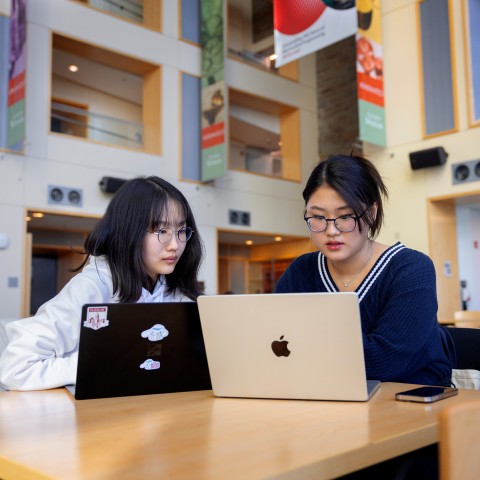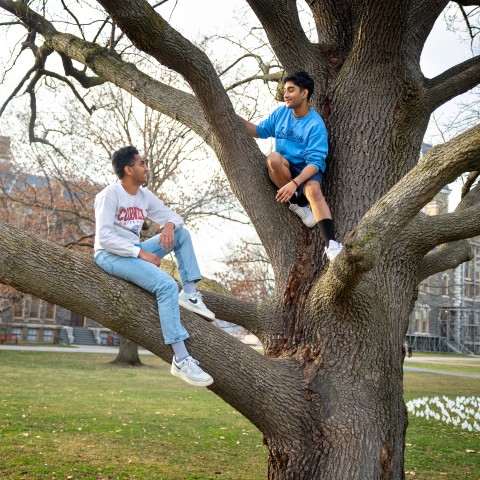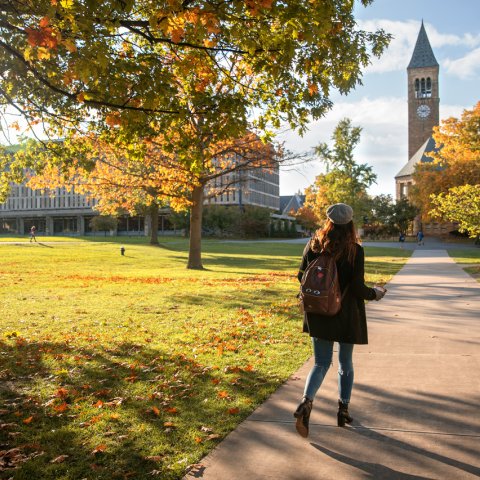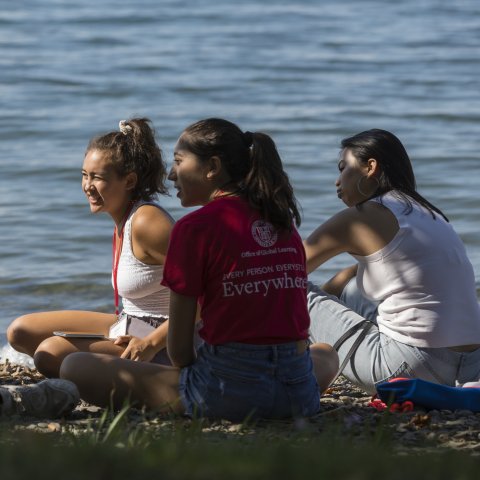Exchange and Visiting Facts
Answers to Your Questions About Exchange and VIS
Whether you're coming to Cornell University to study on international exchange or as a visiting international student, we're excited to welcome you to campus! On this page, you'll find key information and resources to help you prepare for your time at Cornell and settle in after you arrive.
Jump to:
Academics | Orientation | Health | Student Life | Around Campus | Arrival Resources
Academics
Cornell has eight undergraduate colleges and schools, nearly 80 majors, and more than 4,000 courses! Cornell’s academic structure may differ from what you're used to at home.
Colleges Have Distinct Policies
Academic and enrollment policies vary across Cornell's colleges and schools. It's important to learn about your college's policies as you prepare for course enrollment.
Consult these college-specific fact sheets for details about what's available to international undergraduates visiting Cornell. Be aware that colleges have restrictions for incoming students that are not mentioned on the main college websites, which are designed for degree-seeking students.
Courses and Enrollment
While students are asked to provide initial course requests at the time of application, this early step does not constitute course enrollment. Accepted students receive information about enrollment once admitted to Cornell. Any change in the enrollment timeline will be communicated to students.
Class Roster: Course descriptions appear in the class roster. The roster for the appropriate semester may not be available when you're completing your application, so consult the previous year's roster for your intended semester (select the semester on the right side of the roster). The roster for the semester you'll study at Cornell will be available before your enrollment time.
Syllabi: Students typically receive course syllabi on the first day of class. In some cases, syllabi appear in the roster from the previous term.
Be Flexible: Exchange and visiting students register for courses with regular, full-time (matriculated) Cornell students. It is important to be flexible with your course selection and schedule. Work with your home institution for course approval, including alternative options.
When you enroll, you may find that certain courses that interest you are closed or full. We cannot guarantee enrollment in any course, including independent research/study. Enrollment permission is subject to class size limitations, the consent of instructors, and demonstrated academic qualifications in the form of prerequisites.
Graduate Courses: Exchange and visiting students may enroll in 5000-6000 level classes only if they have met the prerequisites. These are traditionally graduate-level classes. Often instructor and college permission will be needed, and it is solely your responsibility to inquire with the professor and college in advance of enrollment to find out if you can join the course.
Advising
Exchange and visiting students are supported by an advisor in the Office of Global Learning throughout their time at Cornell. You will also be assigned an advisor in your home college for academic matters. Depending on the college, you may have a faculty advisor, as well.
Credit Minimums and Limits
Exchange and visiting students on F-1 visas are required to maintain full-time status while studying in the United States. Students must enroll in a minimum of 12 credits per semester during the academic year.
Most exchange students enroll in 14–16 credits per semester. Exceeding 16 credits is not recommended.
Add/Drop
Course changes are possible during the first two weeks of classes, in advance of the “add” deadline. Students may officially drop courses until the "drop" deadline later in the semester. Speak with an advisor before you drop any course.
Grades and Transcripts
Good Academic Standing Policy
Students studying at Cornell for a full academic or calendar year are expected to maintain good academic standing. Good academic standing for exchange and visiting students is defined as:
- Earn a term GPA of 2.0 or higher in their first term at Cornell.
- Successfully completing a minimum of 12 academic credits. To earn credit, students must receive a letter grade of “D-” or higher, OR an “S” in a class taken S/U.
Failure to maintain good academic standing for your first term at Cornell may result in dismissal from the program.
Orientation
All incoming exchange and visiting students participate in a preorientation course. This comprehensive course will help you prepare for your arrival and connect with resources to make your Cornell experience successful and memorable. Topical orientation modules include detailed information to guide and inform you. You'll be added to the course after you're admitted to Cornell and receive a NetID.
All incoming exchange and visiting students are also expected to attend new student orientation programs on campus. Orientation is typically held the week before classes begin. More information about the orientation schedule will be shared in onboarding communications.
Health
Adjusting to a new culture and seeking care within a different healthcare system can be challenging at first. Cornell Health provides a wide range of healthcare services right on campus. Visit this page for international students to get started.
Mandatory Health Insurance
All exchange and visiting students are enrolled in Cornell’s Student Health Plan. Participation is mandatory. Students can't waive the coverage unless covered by an acceptable U.S. employer-based health insurance plan.
Immunizations
Cornell Health Services
Student Life
At Cornell, you'll experience a community that values critical thinking, encourages self-discovery, and embraces all walks of life—surrounded by natural majesty that will inspire your creativity and deepen your focus.
Meals
Cornell eateries provide a delicious variety of options at all hours, and the convenience of eating on campus can't be beat. We recommend purchasing a full or partial dining plan. Restaurants and groceries are available in the Collegetown neighborhood near campus and by bus.
Recreation
Clubs, Community Connections, and More
Exchange and visiting students are eligible to participate in a range of campus activities. Cornell offers many ways to get involved in campus life through student groups, club sports, community service, and more.
Cornell is famous for its student clubs. With 1,000 student clubs across the university, there is something for everyone. Cornell is a leader in public engagement with a focus on community-based initiatives. Find out ways to get involved.
The Office of Global Learning offers special orientation for exchange and visiting students and additional programming throughout the year.
IT Services
Cornell provides an array of IT services, including collaboration software, network printing, and computer labs.
Identity Resources
Disability Services
Cornell is committed to providing an inclusive and successful educational experience for all students. The Student Disability Services Office is part of Cornell Health.
If you need accommodations for disability, medical, or religious reasons, please reach out before you arrive at Cornell. To get the most out of your experience, you should also inform your home university’s exchange administrators about any academic or physical accommodations you expect to need while at Cornell.
Around Campus
Before you arrive, explore the beauty and traditions of campus with Cornell's video tour. After you arrive, use the campus map to navigate.
About Global Cornell
Global Cornell connects Cornell with the world! Our organization is led by Cornell's vice provost for international affairs. Here are some of the internationally engaged units that make up Global Cornell:
The Office of Global Learning has two staff teams that support different campus populations. Education Abroad manages incoming exchange and VIS and also supports undergraduates studying abroad. International Services provides immigration services to international students, faculty, and staff from more than 120 countries on visas sponsored by Cornell.
The Mario Einaudi Center for International Studies brings together faculty and students interested in global research, world cultures and languages, and public engagement. Regional and thematic programs offer many free events, including lectures and seminars.
Cornell University Library
Pick a favorite study spot and do your course projects at Cornell's famous A. D. White Library or one of more than 20 campus libraries. Cornell has the 16th largest library in North America!
Police and Emergencies
The Cornell Police provide 24/7 emergency services information for students on campus. Cornell maintains a robust Emergency Management website with information and contacts to address many types of emergencies.
Arrival Resources
Moving to a new country is exciting—and also confusing! In the first few weeks, there are many new things to learn about and accomplish. We hope this information from International Services will help as you settle in at Cornell.
Still have questions?
Email Us





